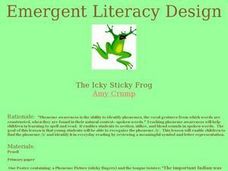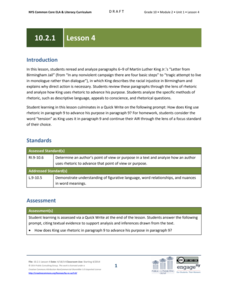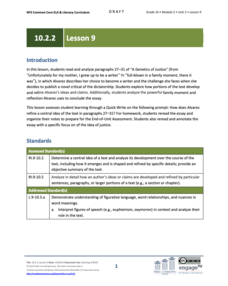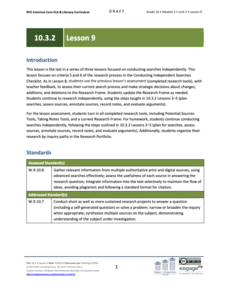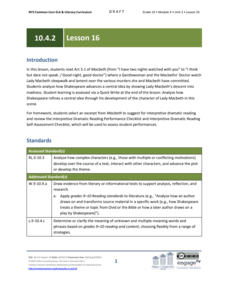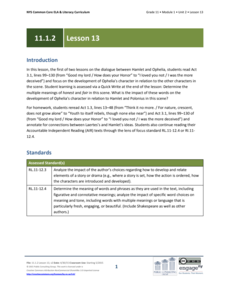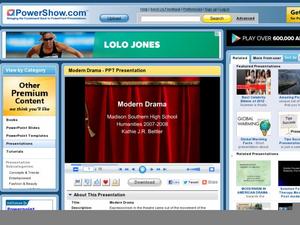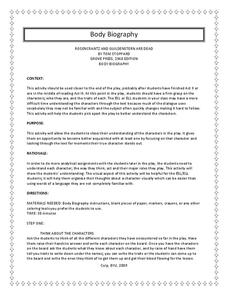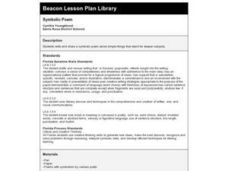Curated OER
The Icky Sticky Frog
Learners practice the strategy of phoneme awareness in order to identify phonemes with vocal gestures in spoken words. They blend letters and sounds together utilizing the phoneme /i/ by symbol and letter representation and listen as the...
Curated OER
Oh Say Can You DDDD!
Young readers see that letters represent phoneme sequences in spoken words. They identify the letter "d," and recognize "d" in spoken words by exploring the meaningful representation and a letter symbol. They practice finding the letter...
Curated OER
Modernism: American Literature 1914-1945
What characterizes modern literature? The first few slides of this 31-slide PowerPoint discuss what sparked the change to Modernism and discuss some of the key figures of the time (like Karl Marx and Sigmund Freud). The 20s and 30s are...
Curated OER
Season Tiles: Ceramics Lesson
Each color holds its own feeling and these feelings are used to describe the four seasons. Youngsters create a color palate based on the four seasons, assigning various colors to each season. They each create four clay tiles, painting...
Curated OER
You Be the Editor
Young editors work in teams to find all the errors in a text. They identify grammar, punctuation, and spelling errors. Use this activity to reinforce correct usage of prominent punctuation symbols, such as apostrophes and ellipses. You...
EngageNY
Grade 10 ELA Module 2: Unit 1, Lesson 4
Just read between the lines. Scholars analyze rhetorical devices in Martin Luther King Jr.'s letter by first discussing them with guided questioning. They then complete a rhetorical impact tracking tool before finishing the lesson plan...
EngageNY
Grade 10 ELA Module 2: Unit 1, Lesson 17
Scholars read the final paragraphs written by Martin Luther King Jr. in "Letter from Birmingham Jail." Readers work in groups to discuss King's word choice and point of view by completing graphic organizers. They also respond to a...
EngageNY
Grade 10 ELA Module 2: Unit 2, Lesson 4
What does it mean to come undone? Scholars consider the author's use of the phrase as they read paragraphs 12–15 from Julia Alvarez's autobiographical essay "A Genetics of Justice." They complete a quick write to analyze how Alvarez...
EngageNY
Grade 10 ELA Module 2: Unit 2, Lesson 2
What is a megalomaniac? Scholars discover the word's meaning as they read and analyze paragraphs seven and eight from Julia Alvarez's essay "A Genetics of Justice." They also read Mark Memmott's article "Remembering to Never Forget" and...
EngageNY
Grade 10 ELA Module 2: Unit 2, Lesson 9
How do authors develop the main ideas in their writing? Pupils consider the question as they read and analyze paragraphs 27–31 from Julia Alvarez's essay "A Genetics of Justice," in which Alvarez describes her decision to become a...
EngageNY
Grade 10 ELA Module 3: Unit 2, Lesson 9
Do you know what the plan is? Scholars are now ready to complete the final instructional activity of independent research before finalizing their plans. Ultimately, they turn in all research tool sheets and frames and organize their...
EngageNY
Grade 10 ELA Module 4: Unit 2, Lesson 6
What decisions might an author make about the structure of a play? Pupils participate in an evidence-based discussion about Shakespeare's choices in Macbeth. Next, scholars analyze the effect of Shakespeare's structural choices in Act 2,...
EngageNY
Grade 10 ELA Module 4: Unit 2, Lesson 9
How does Shakespeare develop the central idea of agency versus fate in Macbeth? Using the resource, pupils work in small groups to discuss the plot of Act 3.1. Next, they complete a brief writing assignment to analyze how the main idea...
EngageNY
Grade 10 ELA Module 4: Unit 2, Lesson 10
Is it better to be dead than to "dwell in doubtful joy," as Lady Macbeth suggests in Act 3.2 of Shakespeare's Macbeth? Using the resource, scholars work in small groups to discuss how Lady Macbeth and Macbeth begin to unravel following...
EngageNY
Grade 10 ELA Module 4, Unit 2, Lesson 26
How do directors' choices emphasize different elements of a drama? Scholars participate in a discussion about the Royal Shakespeare Company production of Macbeth and Akira Kurosawa's Throne of Blood. Finally, they write an analysis of...
EngageNY
Grade 10 ELA Module 4: Unit 2, Lesson 16
How do complex characters develop throughout a text? Pupils read Act 5.1 from Shakespeare's Macbeth, which depicts Lady Macbeth's descent into madness. Using discussion and writing exercises, scholars analyze how Shakespeare develops...
EngageNY
Grade 11 ELA Module 1: Unit 2, Lesson 14
How do Ophelia's interactions with Hamlet help develop her character? Pupils continue reading Act 3.1 from Shakespeare's Hamlet. Using writing and discussion, scholars analyze the dialogue between Hamlet and Ophelia, paying particular...
EngageNY
Grade 11 ELA Module 1: Unit 2, Lesson 13
What impact does word choice have on character development? Using the resource, scholars read Act 3.1 from Shakespeare's Hamlet, focusing on the development of Ophelia's character. They also complete a Quick Write to analyze the meaning...
Curated OER
Drum Roll, Please!
Drill and practice phonemes, letter formations, written language, vowel correspondences, as well as consonant correspondences with youngsters. They will locate and identify the /b/ in written and spoken words from flash cards containing...
Curated OER
Modern Drama
Upper graders can read all about the origins of modern drama. Each slide provides a paragraph of information related to key players, art movements, and time periods that shaped modern drama. It relates well to many aspects of literature...
Brigham Young University
Rosencrantz and Guildenstern Are Dead: Body Biography
Pause in your reading of Rosencrantz and Guildenstern Are Dead to take an in-depth look at the characters. Learners examine a chosen character by drawing a body and assigning quotes and traits to specific areas of the body, thinking...
Curated OER
Personal Peace Symbols
Eleventh graders produce a work of art that symbolizes peace and their experiences with it. In this peace symbolism instructional activity, 11th graders sketch symbols associated with peace view art examples of peace images. Students...
Curated OER
Symbolic Poem
High schoolers read and analyze several highly symbolic poems. They create their own symbolic poem, read it to the class, and discuss whether they can guess any hidden meanings.
Curated OER
Symbolism in Sculpture
Students use criteria developed in class to evaluate which of their own sketches would make the best symbolic sculpture. In this sculpture symbolism lesson, students work in pairs to create a sculpture and define its symbolic meaning....


